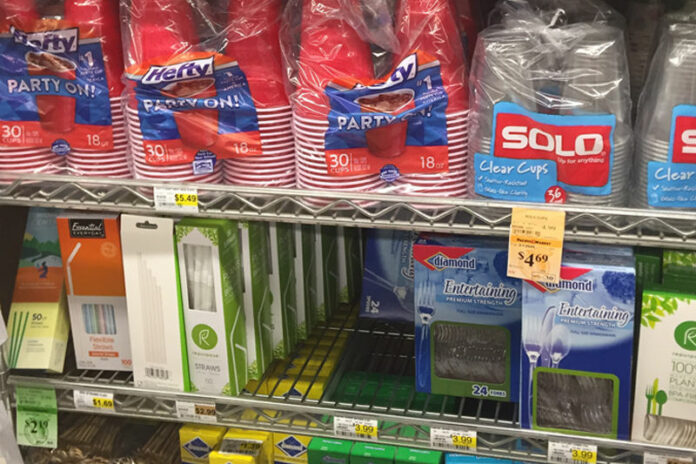
Awareness of the ban is spotty among local merchants
The polystyrene ban passed by the Sebastopol City Council in March went into effect on Monday, Nov. 25, much to the surprise of some local merchants.
This wide-ranging ordinance bans all polystyrene items, ranging from Styrofoam coffee cups to pool noodles, as well as single-use plastics used for food service ware.
The ban will impact grocery stores, the hardware store, drug stores, packaging stores and other retailers, in addition to restaurants and coffee shops.
What’s not allowed
Though it’s known as a polystyrene ban, the ordinance takes aim at a broader range of plastics, including the following:
- polystyrene foam products like cups, plates, clamshells, coolers and ice chests, pool and beach toys and packaging peanuts;
- non-recyclable, disposable, single-use plastics, such as straws and disposable plastic utensils;
- “compostable” bio-plastic cups and cutlery because these are not currently recyclable in Sonoma County;
- some plastic-coated paper food containers.
What’s allowed
The guidelines encourage businesses to use reusable service ware, but some single-use items are allowed including the following:
- uncoated natural plant fiber and paper products (straws, bowls, deli boats, etc.), including bagasse products made from sugar cane fiber;
- 100% wood or bamboo products, such has utensils, chopsticks, stirring sticks, etc.
- single-use food service ware that is easily recyclable, such as those made of glass, aluminum and easily recyclable plastics, like those labeled with a No. 1 recycling code.
“That is the one plastic item we would allow because No. 1 plastics do have a domestic market; whereas items like the Solo cups, which are No. 6, are in the not-allowed group. Those typically get sent overseas and have questionable markets, and a lot of them are getting landfilled and incinerated,” said Sunny Galbraith, head of Sebastopol’s Zero Waste Subcommittee.
The other environmentally questionable item that ordinance allows are plastic-coated paper “hot cups” and soup containers. That’s because, though they’re not recyclable, there are no commercially available alternatives.
“They’re a very challenging item right now,” Galbraith said. “There’s not a compostable paper cup that will hold more than five ounces.”
She also heard an earful from café owners, who explained that there simply wasn’t a green alternative.
Are merchants ready for the ban?
Steve O’Connor is the grocery manager for Fircrest Market. He knew about the ban and didn’t think it would have much effect on his store.
“We haven’t used any of those products, except for, I think, our meat trays, which are exempt. When we first got the notice we went over the list, looked at what we sold and realized that we really weren’t affected. We try to stay ahead of things like this. We’re very fortunate that that what we do already reflects what’s in the law.”
Jessie Dix, a worker at the UPS store on Main Street, said “We’ve been moving away from Styrofoam peanuts for awhile now, so I don’t think it will have any effect on us.”
Not everyone had heard about the ban however. In Starbuck’s, plastic straws were still available for patrons to grab. As of Friday morning — three days before the ban was set to take effect — Pacific Market’s shelves were still stacked with brightly colored single-use plastic utensils, Solo cups and other soon-to-be-verboten items. A few Styrofoam coolers remained as well, left over from the summer season.
Pacific Market General Manager Al Minero was surprised to hear about the ban, but said the store would certainly comply with the new rules.
“Whatever it takes, we’re all for it. We need to get rid of plastic,” he said.
Henry Mikus, engineering manager for the city of Sebastopol, said the city has tried to get the word out. Mikus said a group of volunteers went door-to-door to every business in Sebastopol when the measure first passed and again two weeks ago, handing out flyers to let businesses know what was included in the ban. Sebastopol’s Community Outreach Coordinator Holly Hansen said her office also sent a mass email to local business owners this week.
Mikus said he doesn’t expect full compliance with the ban right off the bat, but said ultimately, “I’m sure we can win people over. Most people want to do the right thing.”
Regarding enforcement, he said, “We’re not going to be heavy-handed. I’m not going to show up with a citation book and give you a fine. If we get a report from a member of the public, we’re just going to pay the business a visit and have a chat. We want to give them every opportunity to make it right.”
Councilmember Sarah Glade Gurney is proud that Sebastopol has taken on the challenge of polystyrene and single-use plastics, which, since they are petrochemical products, she sees as part of the broader climate crisis.
“These changes may be a challenge for our restaurants, other businesses and some folks. I think they will bring about the Sebastopol we want to live in — the community that, in 2050, can look back and say we took action on the climate emergency.”
Here is a link to a short video about the ordinance: http://bit.ly/SebastopolPolystyreneOrdinance








